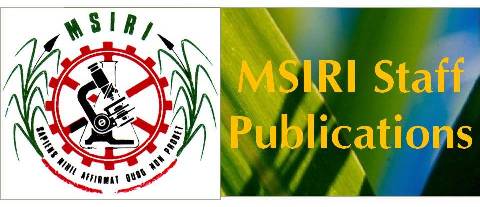A whole-farm ecological approach for management of sugar cane pests in Mauritius
| MSI09P4346 | |
| Ganeshan, S. | |
| A whole-farm ecological approach for management of sugar cane pests in Mauritius | |
| Impact of globalization on sugarcane pests, biodiversity and the environment: 7th ISSCT Entomology Workshop, Estacion Experimental Agroindustrial Obispo Colombres,Tucuman Center, San Miguel de Tucuman, Argentina, April 20-25, 2009 - Programme of events and Abstracts of papers | |
| book chapter | |
| 2009 | |
| p. 13 | |
| Abstracts only | |
| En | |
| En | |
| The main sugar cane pests in Mauritius are the stem borer Chilo sacchariphagus (Lepidoptera: Pyralidae), the armoured scale Aulacaspis tegalensis (Homoptera: Diaspididae), the soft scale Pulvinaria iceryi (Homoptera: Coccidae), the white grub Heteronychus licas (Coleoptera: Dynastidae) and the armyworms Mythimna spp. (Lepidoptera: Noctuidae). Mauritius has a long history of successful biological control of sugar cane pests with cultural practices, e.g. cane trashing being frequently adopted to favour development of natural enemies. Pest outbreaks therefore occurred only occasionally and through the action of natural enemies, the pest populations declined. However, with the intensification of mechanisation of field operations to reduce production costs, major changes are occurring in the sugar cane landscape, causing a shift from a diverse habitat to one where sugar cane monoculture predominates. This loss of biodiversity may be the main cause of recurrent outbreaks of pests hitherto kept under control by a wide array of predators and parasitoids. Except for H. licas, the main sugar cane pests have several natural enemies, which maintain them under control. These natural enemies, it has been observed, have alternate hosts feeding on other plants. Some adult parasitoids feed on the floral nectaries to complete their development. Creation of conservation areas where these plants could be grown is proposed so as to develop an ecological approach for the cultivation of sugar cane. It is reckoned that the conservation and other undisturbed areas would enhance the natural enemy population and thus control incipient outbreaks of the pests. | |
| pests pest control sugarcane biological control parasites conservation areas ecological approach Chilo sacchariphagus Stem borers Aulacaspis tegalensis Armoured scale Soft scale Pulvinaria iceryi white grubs Heretonychus licas armyworms Mythimna | |
| Mauritius | |
| Sugarcane: Pest, pest control and management | |
| Biological control | |
| 2009-05-07 | |
| En | |
| ENTO | |
| CAT | |
| 1 | |
| ENTO |
